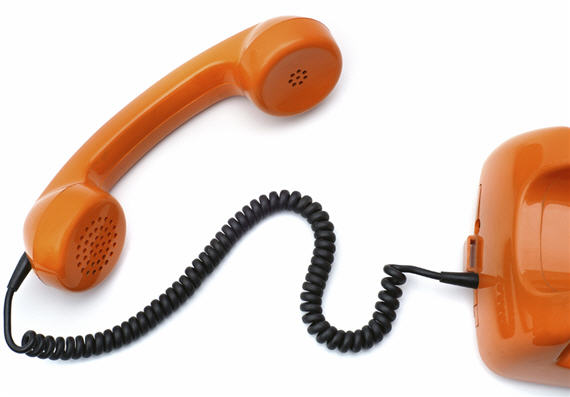Death of the Telephone Call
The phone call is a dying legacy of a bygone day, supplanted by less intrusive forms of communication.
Clive Thompson‘s telephone bills are shrinking. And he’s not alone.
I recently found an old bill from a decade ago; it was fully 15 pages long, because back then I was making a ton of calls—about 20 long-distance ones a day. Today my bills are a meager two or three pages, at most.
Odds are this has happened to you, too. According to Nielsen, the average number of mobile phone calls we make is dropping every year, after hitting a peak in 2007. And our calls are getting shorter: In 2005 they averaged three minutes in length; now they’re almost half that.
We’re moving, in other words, toward a fascinating cultural transition: the death of the telephone call. This shift is particularly stark among the young. Some college students I know go days without talking into their smartphones at all. I was recently hanging out with a twentysomething entrepreneur who fumbled around for 30 seconds trying to find the option that actually let him dial someone.
This generation doesn’t make phone calls, because everyone is in constant, lightweight contact in so many other ways: texting, chatting, and social-network messaging. And we don’t just have more options than we used to. We have better ones: These new forms of communication have exposed the fact that the voice call is badly designed. It deserves to die.
Consider: If I suddenly decide I want to dial you up, I have no way of knowing whether you’re busy, and you have no idea why I’m calling. We have to open Schrödinger’s box every time, having a conversation to figure out whether it’s OK to have a conversation. Plus, voice calls are emotionally high-bandwidth, which is why it’s so weirdly exhausting to be interrupted by one. (We apparently find voicemail even more excruciating: Studies show that more than a fifth of all voice messages are never listened to.)
The telephone, in other words, doesn’t provide any information about status, so we are constantly interrupting one another. The other tools at our disposal are more polite. Instant messaging lets us detect whether our friends are busy without our bugging them, and texting lets us ping one another asynchronously. (Plus, we can spend more time thinking about what we want to say.) For all the hue and cry about becoming an “always on” society, we’re actually moving away from the demand that everyone be available immediately.
In fact, the newfangled media that’s currently supplanting the phone call might be the only thing that helps preserve it. Most people I know coordinate important calls in advance using email, text messaging, or chat (r u busy?). An unscheduled call that rings on my phone fails the conversational Turing test: It’s almost certainly junk, so I ignore it.
I haven’t gotten to that point yet. But I do find unexpected phone calls incredibly annoying, especially when coupled with the expectation that I drop what I was doing and chat until the person who called is done. And I don’t even feign politeness when it comes to solicitation calls, simply hanging up the instant I become aware that I’m not interested.
But, while email, texting, and so forth are indeed much less invasive than telephone calls, they’re also much more frequent. As I described in “Etiquette in an Always-On World,” there’s an increasing expectation of being available on demand to respond to digital requests.







The inconvenience of voicemail is one reason I’m a big fan of Google Voice. It transcribes my voicemails and emails them to me. Saves me from listening to a 90 second message that basically says call me back when you get this.
Texting, Tweeting, and chats, I believe are very inpersonnable types of communications.
They are great if you really don’t care about any real emotionable feedback from the person you are talking to, such as; tone of voice, or other indicators.
I am not against the new wave of communications. I thaink they are great for quick messages, or questions, or just information distribution. I just beleive that if you want to have a serious interpersonal conversation, Do it in-person
Bah. I’m a 20-something, and I like phone calls. There’s a complete opposite case to be made. Frankly, texting/typing takes a long time. It’s just damn slow. even an IM with someone who actually has an attention span and gives it to you will take five times as long as a voice conversation. And that’s rare. A phone call has the advantage of the other person’s undivided attention; the spoken word is much quicker for negotiation than the typed one and much more flexible, and last but not least, a better vehicle for human emotion.
It’s natural that this shrinks as typing becomes easier to do and more mobile, but it’s not going anywhere (hello! “voice chat”?)
@Alp and @Glasnost
I don’t disagree that telephone and, especially, face-to-face are better for certain kinds of communication.
The problem, as Thompson notes, is that we’re used to asynchronous or otherwise less intrusive forms. I didn’t include the last part of his piece, where he speculates that phones may soon come with an “availability” feature much like IM, where you can specify that you don’t want to be bothered.
a pox on all your houses…
I have email which I may or may not check once or twice a week. No twitter, no facebook, no yahoo messenger, no IM, no …. anything else. If you call my home phone, I might answer.
If you call my cell phone, my message says,”Don’t bother, if I had wanted to talk to you, I would have answered.”
I can see this coming.
We no longer have a home phone-we are cell phones only.
My teenagers almost never actually make phone calls, they text-and one of them is almost constantly texting various friends, but they actually don’t want to make phone calls.
I have noticed my husband and I do more texting than actual calling. We only call if we have something more complicated to say.
I still call and talk to my sister and other family members who live far away, but thats probably because I don’t really do various other social media type stuff.